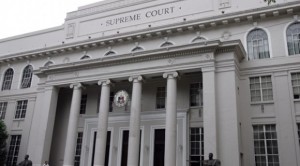MANILA, Philippines—The Supreme Court has affirmed the constitutionality of Internet libel and majority of the provisions of Republic Act 10175 or the Cybercrime Prevention Act.
High Court’s Information Chief Theodore Te explained that only the author of a libelous post can be prosecuted.
However, there is no online libel for those who simply receive and react to a libellous post.
“The Court also ruled on the constitutionality of online libel when it further declared that Section 4(c)(4) which penalizes online libel is not unconstitutional with respect to the original author of the post but unconstitutional only where it penalizes those who simply receive the post or react to it,” Te said at a press conference Tuesday.
Other provisions declared as unconstitutional either wholly or contextually are the following:
· Sec. 4(c)(3) (Unsolicited Commercial Communications
· Sec. 12 (Real time collection of traffic data)
· Sec. 19 (Restricting or blocking access to computer data)
· Sec. 5 (aiding or abetting in the commission of a cybercrime/attempt to commit a cybercrime) only in relation to secs. 4(c)(2) (child pornography), 4(c)(3) (unsolicited commercial communications) and 4(c)(4) (libel);
· Sec. 7 which provides that apart from prosecution under the law, they can also be prosecuted for same offenses under the Revised Penal Code is unconstitutional only in relation to secs. 4(c)(4) (libel) and 4(c)(2) (child pornography).
A total of 15 petitions have been filed in 2012 questioning the legality of the law. A 120-day restraining order has been issued against its implementation.
Te said with the high court’s ruling, the restraining order is deemed lifted.
Bayan Muna Representative Neri Colmenares expressed disappointment over the high court’s ruling.
“It upheld cyber libel as constitutional meaning it is now prohibited for Filipinos to voice their disgust with government, Meralco, traffic or what not through the internet…We will still file for a motion for reconsideration,” Colmenares said.
Justice Secretary Leila De Lima, on the other hand said with the high court’s ruling, they will start engaging stakeholders to issue the implementing rules and regulations (IRR) as required by law and the procedures to aid law enforcers to investigate core cybercrime cases.
“A clear legal framework is necessary to protect citizens and balance state duties. We will continue to recommend best practices to improve the law,” De Lima said in a statement.
RELATED STORIES
SC asked to declare libel provisions in penal code unconstitutional
Sotto admits he proposed online libel provision
